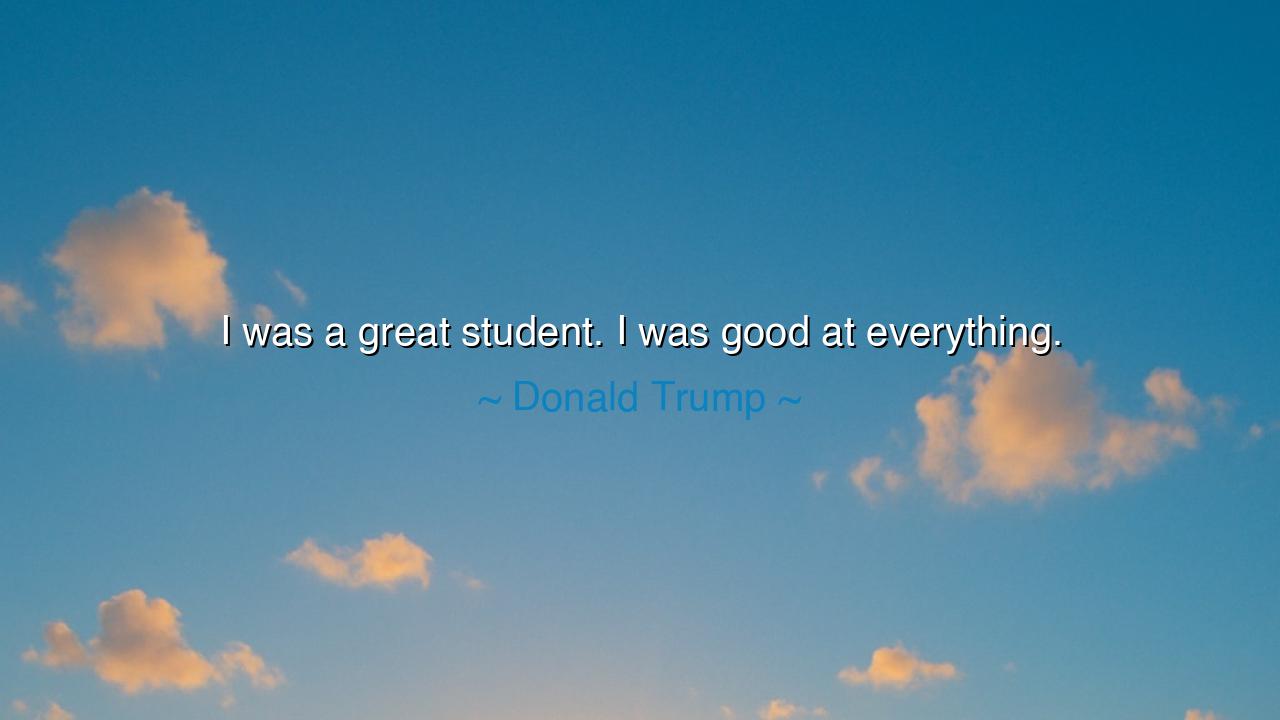
I was a great student. I was good at everything.






“I was a great student. I was good at everything.” Thus declared Donald Trump, a man whose name has come to signify ambition, confidence, and controversy in equal measure. Though his words may seem boastful to the casual ear, within them lies a reflection of an ancient truth — the belief in the power of self-conviction, the shaping of destiny through the certainty of one’s own worth. To say such words is not merely to recount the past, but to proclaim mastery over it — to define one’s life by the strength of belief rather than the verdict of others.
In their essence, these words echo the eternal principle that self-belief precedes achievement. For how can one hope to conquer the world without first conquering the doubt within? Trump’s assertion — that he was “good at everything” — may appear grand, yet it is an expression of the primal force that has driven the builders of empires, the explorers of oceans, and the dreamers of impossible dreams. Those who accomplish great things rarely begin with certainty from others; rather, they begin with the conviction that they can. Confidence, when guided by purpose, becomes a creative fire — it turns thought into deed, ambition into reality.
To understand the origin of this statement, one must see the man as both a product of his age and of his own relentless will. Donald Trump, long before he became a figure of political and cultural debate, was a builder — a creator of monuments in steel and glass. His empire began not in abundance, but in aspiration. From his youth, he cultivated an image of victory, learning early that in a world of competition, perception shapes power. His declaration, then, is more than vanity — it is a creed, a reminder that the path to greatness often begins with unshakable confidence. Whether born of truth or self-creation, this faith in one’s potential becomes the cornerstone of all achievement.
History, too, bears witness to the might of such conviction. Alexander the Great, at the age of twenty, declared himself destined to conquer the known world — and did. Julius Caesar, standing on the shores of the Rubicon, did not ask whether he was ready; he simply crossed, believing that his will could move nations. And centuries later, Thomas Edison, after countless failures, refused to accept defeat, claiming instead that each misstep brought him closer to success. These figures shared with Trump a fierce, almost defiant belief in themselves — a refusal to shrink before challenge or criticism. To believe oneself capable of “everything,” in their world, was not arrogance but fuel — the divine madness of visionaries who bend reality to their purpose.
Yet, as with all power, confidence must be tempered with wisdom. The ancients warned that hubris — pride without humility — leads to downfall. The line between greatness and ruin is drawn not by belief alone, but by balance. To be “good at everything” is not to be flawless, but to embrace the willingness to learn, adapt, and persist through failure. True mastery lies not in denying imperfection, but in using belief as the force that propels one through it. The wise understand that confidence, when coupled with discipline, becomes strength; but confidence without reflection becomes folly.
Therefore, my children, learn from this declaration not to imitate its pride, but to grasp its essence. Do not fear to believe in your own greatness, for the world belongs to those who dare to claim it. But let your belief be forged in the fires of effort, not mere words. Say, as Trump once did, “I am good at everything” — not to boast, but to remind yourself that you are capable of learning anything, mastering anything, becoming anything. For the one who believes they can, already stands ahead of the one who doubts they will.
And remember this: confidence is the seed, but action is the harvest. Speak boldly of your dreams, but then labor until your deeds make your words truth. Let faith in yourself be the wind that lifts your wings — yet keep humility as the compass that guides your flight. For it is not wrong to say, “I was great,” if greatness was earned; nor wrong to believe, “I can be great,” if the belief is followed by purpose. So rise each day with the heart of the great student — ever learning, ever striving, certain not of perfection, but of potential. For in that certainty lies the secret of all who have built, conquered, and endured: that the greatest victory begins in the mind that refuses to doubt its power to achieve.






AAdministratorAdministrator
Welcome, honored guests. Please leave a comment, we will respond soon